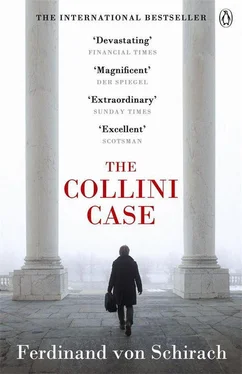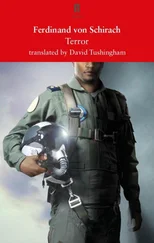The presiding judge couldn’t conceal a smile. Leinen smiled back.
‘I can see,’ she said, ‘that we needn’t fear the defendant will not be ably represented. Let’s leave it at that for now, then. Have a nice day, and we’ll meet again on Wednesday.’
Reimers put his files together, Leinen and Mattinger went to the door of the courtroom. Mattinger laid his hand on Leinen’s forearm.
‘Well done, Leinen,’ he said. ‘Now for the press.’ He nodded briefly to Leinen and went to the double doors. The photographers’ flashlights dazzled them. Mattinger placed himself in front of the cameras. In spite of his tanned skin, he looked pale just now, and Leinen heard him saying again and again, ‘Wait for the end of the trial, ladies and gentlemen, and then we’ll see. I’m sorry, but I’m not making any comment now. Wait and see.’
Leinen made his way past the reporters.
Johanna was waiting in a taxi outside the courthouse. She asked the cabby to take them to Charlottenburg Palace. They looked out of their respective windows, not knowing what to say to each other. It was warm in the sun, but the park behind the palace lay in shade, and there was a chilly wind. An old woman was scattering birdseed on the path; she must have found some left over from winter.
‘Crows never beg for food,’ he remarked, just for something to say.
They walked side by side for a long time in silence. Johanna’s shoes were too thin for the gravel path. The pale blue copper roof of the tea house shone in the sunlight. They heard a voice coming over a loudspeaker on a tourist boat going along the river Spree. The old woman was sitting on a park bench now. She wore red woollen gloves with the fingers cut away. Her bag of birdseed was empty.
Suddenly Johanna stopped and looked at Leinen. For the first time, he noticed a little scar over her right eyebrow. ‘I’m cold,’ she said. ‘Let’s go home. I don’t have to get back to London until tomorrow.’
Leinen had rented the apartment while he was still training, and he didn’t want to move; he had as much space as he needed. Two rooms, a typical old-style Berlin apartment, whitewashed walls, high ceilings, wooden flooring, a small bathroom. There were bookshelves lining almost all the walls, and books everywhere else too; they lay on the floor, the sofa, the chairs, they were piled on the side of the bathtub. Johanna looked at everything. The wooden head of a Buddha stood among the books. There was a rusty spear-point from East Africa on another shelf, and two pencil drawings hung in the corridor: the orchard at Rossthal. A few photographs stood on the windowsill: his father in a green hat, his mother outside the forester’s house. A silver-framed photo of half a dozen young men on the steps outside the boarding school; she recognized Caspar and Philipp.
They drank coffee to warm them up. They talked about Johanna’s life in London, her friends, the auction house where she worked. After a while she leaned forward over the table. Leinen took her head in his hands as he kissed her, and a plate with bread on it fell on to the tiled floor and broke. Leinen was thinking that tomorrow morning she would be going away, back to London and another life, one he didn’t know.
Around five he woke to find the room still dark. Johanna was sitting naked on the floor in front of the balcony door, her legs drawn up, her head resting on her knees. She was crying. He got out of bed and put a blanket round her shoulders.
In the morning he took Johanna to the airport. People were meeting and seeing each other off, people whose childhoods were not being destroyed by any murder trial. Johanna kissed him, checked in, went through security and disappeared behind a blank screen. He was afraid of losing her just as he had lost Philipp. Suddenly everything around him was moving sluggishly. The benches, the floor, the people, the sounds were strange and muted, the lighting was all wrong. A girl with a wheelie case collided with him before he could avoid her. Leinen stood for almost ten minutes in the airport concourse. He saw himself from the outside, as a stranger who had only a tenuous connection to him. After a while he succeeded in folding his hands and, trying to remember the size and shape of his fingers, he gradually came back to life. He went to the toilets, washed his face and looked at his reflection in the mirror until he felt more like himself again.
At the airport news-stand he bought all the papers and read them sitting in his car in the car park. The tabloids featured the trial on the front page. A traffic warden tapped his windscreen and told him he couldn’t park there any longer.
For the first five days of the trial, the court heard evidence from witnesses of the crime and statements from expert witnesses. The presiding judge was well prepared. She asked her questions in a thorough, experienced way, and seemed impartial. There were no surprises; the witnesses repeated exactly what they had already told the police. Senior Public Prosecutor Reimers had hardly any questions, but sometimes enlarged on a point.
Mattinger dominated the trial. The forensic pathologist was called as the first expert witness. Mattinger asked Professor Wagenstett about the angles of the gunshots, the entry and exit wounds, the marks left by Collini’s shoe, the intervals between kicks, the kicking itself, and got the professor to explain all the details as illustrated by the photographs. Leinen saw that the two lay judges were sickened by the pictures taken at the autopsy, which would surely linger in their memory. Mattinger asked questions in plain language that everyone could understand. Whenever Wagenstett used a technical medical expression, he asked for a translation, and if the forensic pathologist had none, Mattinger got him to describe what he was saying in simple words. After two hours everyone in the courtroom had a mental picture of a brutal thug forcing a defenceless old man to his knees and shooting him in the head from behind. Mattinger had not once raised his voice; he made no sweeping gestures. The old lawyer sat quietly in his place, asked straightforward questions and looked composed. He was relying on the images in the minds of everyone listening.
After five days it seemed that the rest of the trial would be mere routine. The presiding judge continued to be friendly, the court reporter with the ponytail glanced at Leinen with increasing sympathy. The interest of the press flagged; fewer journalists came to the courtroom every day. It was generally agreed in the newspapers that Collini could only be a lunatic. On the sixth day one of the lay judges, both of whom happened to be women, fell ill with a bad attack of flu, and the presiding judge adjourned the trial for ten days.
Leinen realized that he was losing the case. He had spent every evening sitting in his chambers, looking through the files. For the hundredth time, he had read the witness statements, the account of the autopsy, the reports of expert witnesses and the comments of the police detectives. The crime-scene photographs hung on his office walls; he had stared at them daily and found nothing. It was the same today. Around ten in the evening he switched off his desk lamp. He watched his cigarette smoulder and go out in the ashtray, and could smell the singed filter. Mattinger had said he should think; the answers were always somewhere in the files, you just had to read them correctly. But how, Leinen wondered, do you defend a man who doesn’t want to defend himself?
It occurred to him that he had forgotten to call his father today and wish him a happy birthday. He looked at the time and dialled the number in the dim light of the room. His father sounded the same as usual; he said he was just cleaning the shotguns, he’d been out in the game preserves all day, clearing the feed troughs.
Читать дальше












